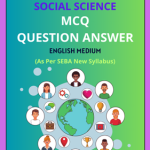SEBA Class 6 Social Science MCQ Chapter 23 The Central and The State Government Solutions in English Medium, Class 6 Social Science Multiple Choice Question Answer to each chapter is provided in the list so that you can easily browse throughout different chapters SEBA Class 6 Social Science MCQ Chapter 23 The Central and The State Government Question Answer and select need one.
SEBA Class 6 Social Science MCQ Chapter 23 The Central and The State Government
Also, you can read the SCERT book online in these sections SEBA Class 6 Social Science Objective Type Solutions by Expert Teachers as per SCERT (CBSE) Book guidelines. These solutions are part of SCERT All Subject Solutions. Here we have given Assam SEBA Class 6 Social Science MCQ Solutions for All Subject, You can practice these here.
The Central and The State Government
Chapter – 23
| MCQ |
1. Who is the head of the central government in India?
(a) Chief Minister.
(b) President.
(c) Prime Minister.
(d) Governor.
Answer: (c) Prime Minister.
2. What is the primary function of the central government?
(a) To manage local affairs.
(b) To make laws for the entire country.
(c) To conduct state elections.
(d) To handle village panchayats.
Answer: (b) To make laws for the entire country.
3. Who is the head of the state government in India?
(a) President.
(b) Prime Minister.
(c) Chief Minister.
(d) Mayor.
Answer: (c) Chief Minister.
4. What does the legislature do?
(a) Enforces laws.
(b) Interprets laws.
(c) Make laws.
(d) Implements laws.
Answer: (c) Makes laws.
5. Which of the following is not a function of the state government?
(a) Managing state police.
(b) Overseeing state transport.
(c) Conducting national defence.
(d) Administering state healthcare.
Answer: (c) Conducting national defence.
6. Who appoints the Governor of a state?
(a) Chief Minister.
(b) President of India.
(c) Prime Minister.
(d) Speaker of the Lok Sabha.
Answer: (b) President of India.
7. What is the primary role of the judiciary?
(a) To make laws.
(b) To enforce laws.
(c) To interpret laws.
(d) To implement laws.
Answer: (c) To interpret laws.
8. Which house is known as the upper house of the Parliament?
(a) Lok Sabha.
(b) Rajya Sabha.
(c) Vidhan Sabha.
(d) Vidhan Parishad.
Answer: (b) Rajya Sabha.
9. How are members of the Lok Sabha elected?
(a) By the President.
(b) By the Prime Minister.
(c) Through general elections.
(d) By the Governor.
Answer: (c) Through general elections.
10. Who presides over the sessions of the Lok Sabha?
(a) President.
(b) Vice President.
(c) Speaker.
(d) Prime Minister.
Answer: (c) Speaker.
11. Which body advises the President of India?
(a) Parliament.
(b) Council of Ministers.
(c) Judiciary.
(d) Election Commission.
Answer: (b) Council of Ministers.
12. How often are general elections held in India?
(a) Every 3 years.
(b) Every 4 years.
(c) Every 5 years.
(d) Every 6 years.
Answer: (c) Every 5 years.
13. Who is the highest judicial authority in India?
(a) President.
(b) Chief Justice of India.
(c) Prime Minister.
(d) Attorney General.
Answer: (b) Chief Justice of India.
14. What is the minimum age requirement to become a member of the Lok Sabha?
(a) 18 years.
(b) 21 years.
(c) 25 years.
(d) 30 years.
Answer: (c) 25 years.
15. Which part of the government is responsible for implementing laws?
(a) Legislature.
(b) Judiciary.
(c) Executive.
(d) Parliament.
Answer: (c) Executive.

Hi! my Name is Parimal Roy. I have completed my Bachelor’s degree in Philosophy (B.A.) from Silapathar General College. Currently, I am working as an HR Manager at Dev Library. It is a website that provides study materials for students from Class 3 to 12, including SCERT and NCERT notes. It also offers resources for BA, B.Com, B.Sc, and Computer Science, along with postgraduate notes. Besides study materials, the website has novels, eBooks, health and finance articles, biographies, quotes, and more.



